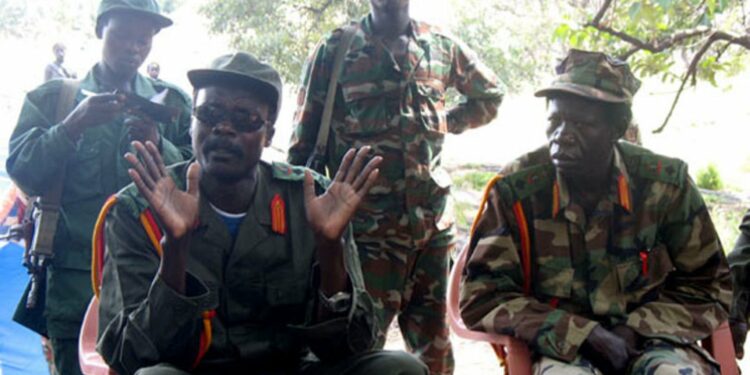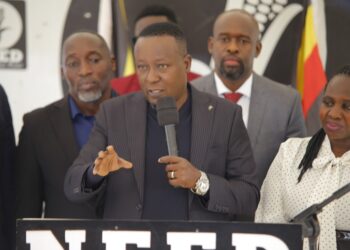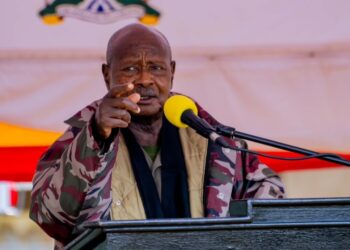In a startling revelation that has raised significant questions, the International Criminal Court (ICC) recently confirmed the death of Vincent Otti, a key figure in the Lord’s Resistance Army (LRA), after an astonishing 15-year delay. Otti, a notorious commander within the LRA, had been the subject of an arrest warrant by the ICC for alleged war crimes and crimes against humanity.
However, the prolonged period taken by the ICC to confirm Otti’s death and subsequently withdraw the arrest warrant has sparked widespread curiosity and scrutiny of the circumstances surrounding this delay.
The perplexing timeline of events surrounding Vincent Otti’s fate has ignited a flurry of inquiries into the ICC’s operational processes and the intricacies of confirming the demise of individuals under investigation. Otti’s role within the LRA, notorious for its brutal tactics and extensive human rights violations, had made him a significant target for international justice.
Despite being declared dead by Ugandan military forces in 2007, it was only after 15 years that the ICC officially acknowledged Otti’s demise, prompting probing questions about the delays in verifying such crucial information.
The prolonged delay in confirming Otti’s death and retracting the arrest warrant has underscored the challenges faced by international legal bodies in verifying the status of indicted individuals in conflict zones, particularly in cases where information may be scarce or unreliable.
The case has also reignited debates about the efficiency and responsiveness of international justice mechanisms, highlighting the complexities involved in pursuing justice for crimes committed in conflict-ridden regions, where accurate information can be elusive and the situation on the ground is often volatile. As discussions intensify, the ICC faces mounting pressure to elucidate the reasons behind the extended timeframe and offer transparency regarding the processes that led to this significant revelation.
According to a press release by the ICC issued on 17th November 2023, the Chamber made this decision following the Prosecution’s ‘Third Request to Terminate Proceedings against Vincent Otti.
In the third request, the Prosecution explained that “all available evidence indicates that Mr Otti was killed in a remote area of the Democratic Republic of Congo in October 2007.” In addition to the information previously submitted before the Chamber, the Prosecution appended two witness statements and explained that the only eye witness to Mr Otti’s killing must also be assumed dead. It indicated that further investigative steps are unlikely to result in any additional proof of Mr Otti’s death.
In its decision, the Chamber found that the only reasonable conclusion is that Mr Otti is no longer alive. The Chamber recalled that the Court cannot exercise jurisdiction over a deceased person. The death of the suspect therefore required to termination of the proceedings against Mr Otti, further to which all relevant documents, including any warrants of arrest, are rendered without effect.
Why the Delay
In the pre-trial before Judge Rosario Salvatore Aitala, Presiding Judge Judge Tomoko Akane and Judge Sergio Gerardo Ugalde Godínez, after confirming the death of Otti on 7th October 2008, prosecutor Karim A.A. Khan KC filed the “Prosecutor’s Request that the Warrant of Arrest for Vincent OTTI Be Withdrawn and Rendered without Effect because of His Death”.
That filing summarised then-available evidence, including public statements by Joseph Kony and witness statements obtained by the Prosecution, indicating that Mr Otti had been killed on Mr Kony’s orders in early October 2007, in Garamba National Park, Democratic Republic of the Congo (DRC).
However, the court rejected the request alluding that there was a piece of inappropriate information, on 28 March 2022, the Prosecution filed a renewed request to terminate proceedings against Mr Otti on account of his death. That filing summarized additional evidence of Mr Otti’s death, including sworn witness testimony from the ICC trial of Dominic Ongwen. The Prosecution also submitted additional information in support of its renewed request on 23 May 2022.
On 1 December 2022, the Chamber rejected the Prosecution’s renewed request to terminate the proceedings but stated its availability to consider a new request based on additional evidence.
Since the Chamber’s December 2022 decision, the Prosecution under the leadership of Karim A.A. Khan KC added additional steps to obtain evidence of Mr Otti’s death. The Prosecution also inquired with witnesses regarding leads for additional information, interviewed two new witnesses with relevant knowledge of the events, further reviewed its existing evidence collection, and submitted additional requests for assistance to the Ugandan authorities.
The evidence collected through these efforts corroborates witness UGA-OTP-P-1030 a former forced wife of Joseph Kony. Narrated that she heard the gunshots that she believed killed Mr Otti, and then heard Mr Kony taking credit for the killing. Witness UGA-OTP-P-0455 also a former LRA commander, revealed how they discussed the plan to kill Mr Otti with Mr Kony and then heard the gunshots which he believes killed Mr Otti, although he did not see Mr Otti’s body.
According to the prosecutor’s report, one person named by witnesses as being directly involved in the killing of Mr Otii was reportedly killed by the Ugandan military in the Central African Republic on 1 January 2010.
In the report again, the prosecution informed the chambers that they had been unable to locate or recover Mr Otti’s body. They noted that Mr Otti was allegedly killed more than 15 years ago, in a remote area within Garamba National Park, DRC. In the words of witness P-0455, Mr Otti “was taken deep inside the bush and killed […] there”. These circumstances make the future recovery of Mr Otti’s body, or other physical evidence of his death, highly unlikely.
He also informed the chamber that the prosecution had not encountered any information that would suggest Mr Otti is alive. “In light of these circumstances, and the investigative steps taken to date, further investigation is unlikely to result in more definitive evidence proving his death. To bring some degree of closure to the victims and communities affected by Mr Otti’s crimes, the Prosecution, therefore, requests that the proceedings against Mr Otti be terminated,” reads a document of the third request submitted on the 15th day of November 2023.
It was from this third request the chambers on 17th November 2023, considered to terminate the proceedings against Mr Otti, further to which all relevant documents, including any warrants of arrest, are rendered without effect.
Meanwhile, the Warrant of Arrest for Vincent Otti was issued under seal on 8 July 2005 and unsealed on 13 October 2005. He was suspected of eleven counts of crimes against humanity (murder, sexual enslavement, inhumane acts of inflicting serious bodily injury and suffering) and twenty-one counts of war crimes (rape, intentionally directing an attack against a civilian population, forced enlistment of children, cruel treatment of civilians, pillaging, and murder) allegedly committed in northern Uganda after 1 July 2002. Mr Otti’s case was joined to the case of other LRA commanders Joseph Kony and Dominic Ongwen.
Do you have a story in your community or an opinion to share with us: Email us at editorial@watchdoguganda.com













